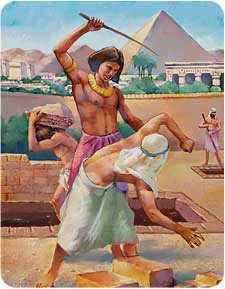Post Author: Bill Pratt
 After successfully convincing their fellow Israelites that the God of their ancestors had sent them, Moses and Aaron boldly approach Pharaoh and request that he let them go to the desert to worship. Pharaoh’s response frames the events that will take place in chapters 7 through 12 of Exodus.
After successfully convincing their fellow Israelites that the God of their ancestors had sent them, Moses and Aaron boldly approach Pharaoh and request that he let them go to the desert to worship. Pharaoh’s response frames the events that will take place in chapters 7 through 12 of Exodus.
Pharaoh’s response is, “Who is the LORD, that I should obey him and let Israel go? I do not know the LORD and I will not let Israel go.” The purpose of the 10 plagues that will follow is to demonstrate to Pharaoh, the people of Egypt, and the reader, who the God of Israel is.
Not only does Pharaoh reject their request, he acts to further punish the Israelites and turn them against Moses and Aaron. In verses 4-11, Pharaoh accuses Moses and Aaron of distracting the Israelites from their work, that of making bricks for Egyptian construction projects (see this link for more detail on brick-making).
Typically, when bricks were made, the Egyptians would supply the Israelite laborers with straw to mix with clay in order to mold the bricks. Instead, the Israelites would now be expected to gather their own straw to make the bricks, and the number of bricks they would have to make would not decrease, but stay the same.
In verses 12-14, the Israelites fail to make the required number of bricks, and the Israelite foremen are beaten. Disillusioned with the impossible task they’ve been given, the foremen go before Pharaoh to complain about their plight. Pharaoh, showing no mercy, responds, “Lazy, that’s what you are—lazy! That is why you keep saying, ‘Let us go and sacrifice to the LORD.’ Now get to work. You will not be given any straw, yet you must produce your full quota of bricks.”
The foremen now realize that Pharaoh is punishing them because of Moses and Aaron, so in verses 20-21 they confront the two men and ask that God judge them for inciting Pharaoh. What a turn of events! A short time earlier, the leaders of Israel were receiving Moses and Aaron with joy, and now they are cursing them. The fickleness of Israel toward God’s prophets will be a central theme of the Bible all the way up through the deaths of Jesus and his apostles.
Moses then questions God, saying, “O Lord, why have you brought trouble upon this people?” God, however, in chapter 6, verse 1, reassures Moses. He explains, “Now you will see what I will do to Pharaoh: Because of my mighty hand he will let them go; because of my mighty hand he will drive them out of his country.”
The focus, again, is put back on God. Moses and Aaron can do nothing for the Israelites, on their own. Only God, acting on behalf of Israel, can effect their release from bondage. Pharaoh has thrown down the gauntlet, so to speak. He has refused to even allow the Israelites to worship God for a measly three days. He has questioned the very existence of the God of Israel. In the following chapters, God will make himself known to Pharaoh and to all the people of Egypt.